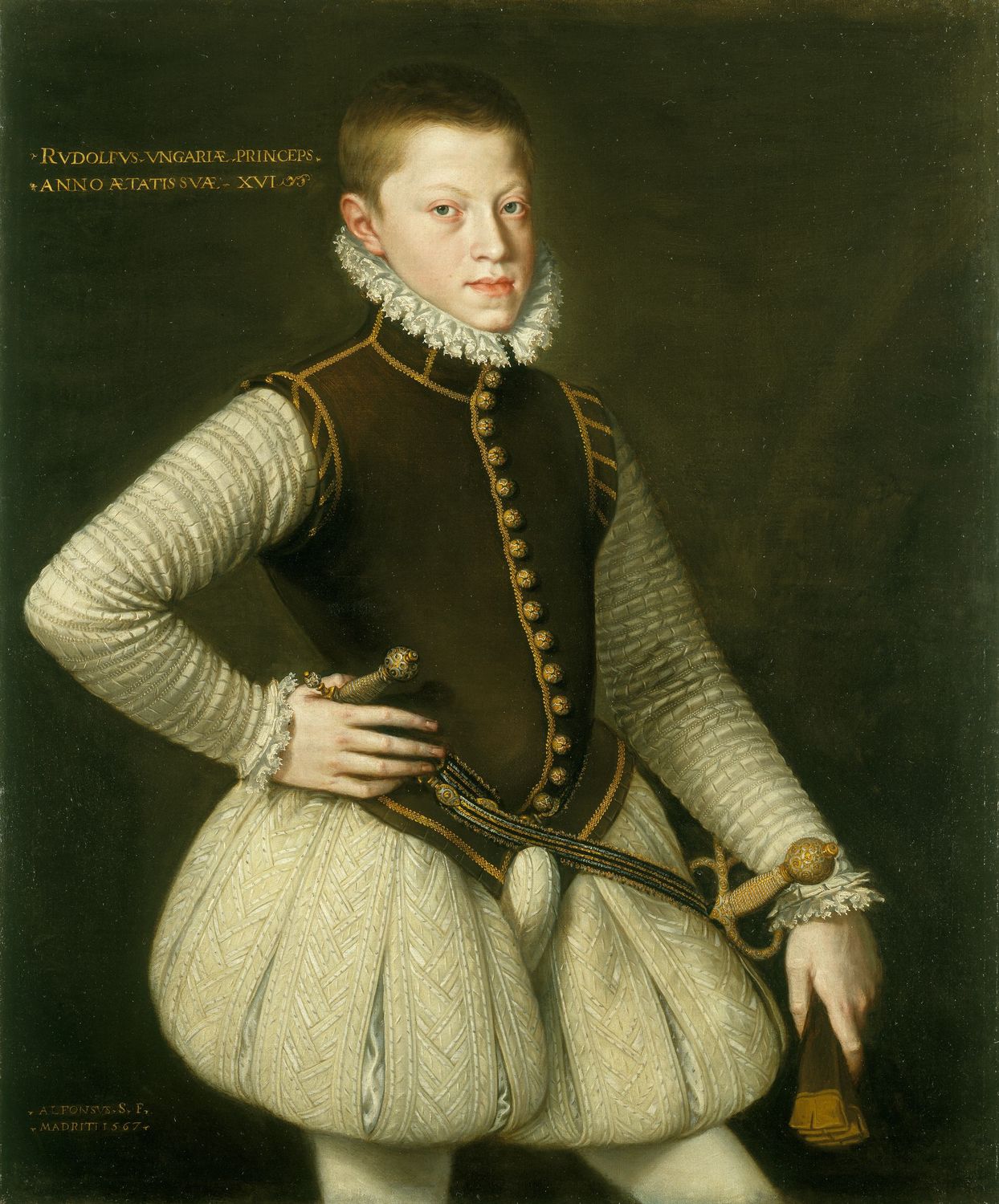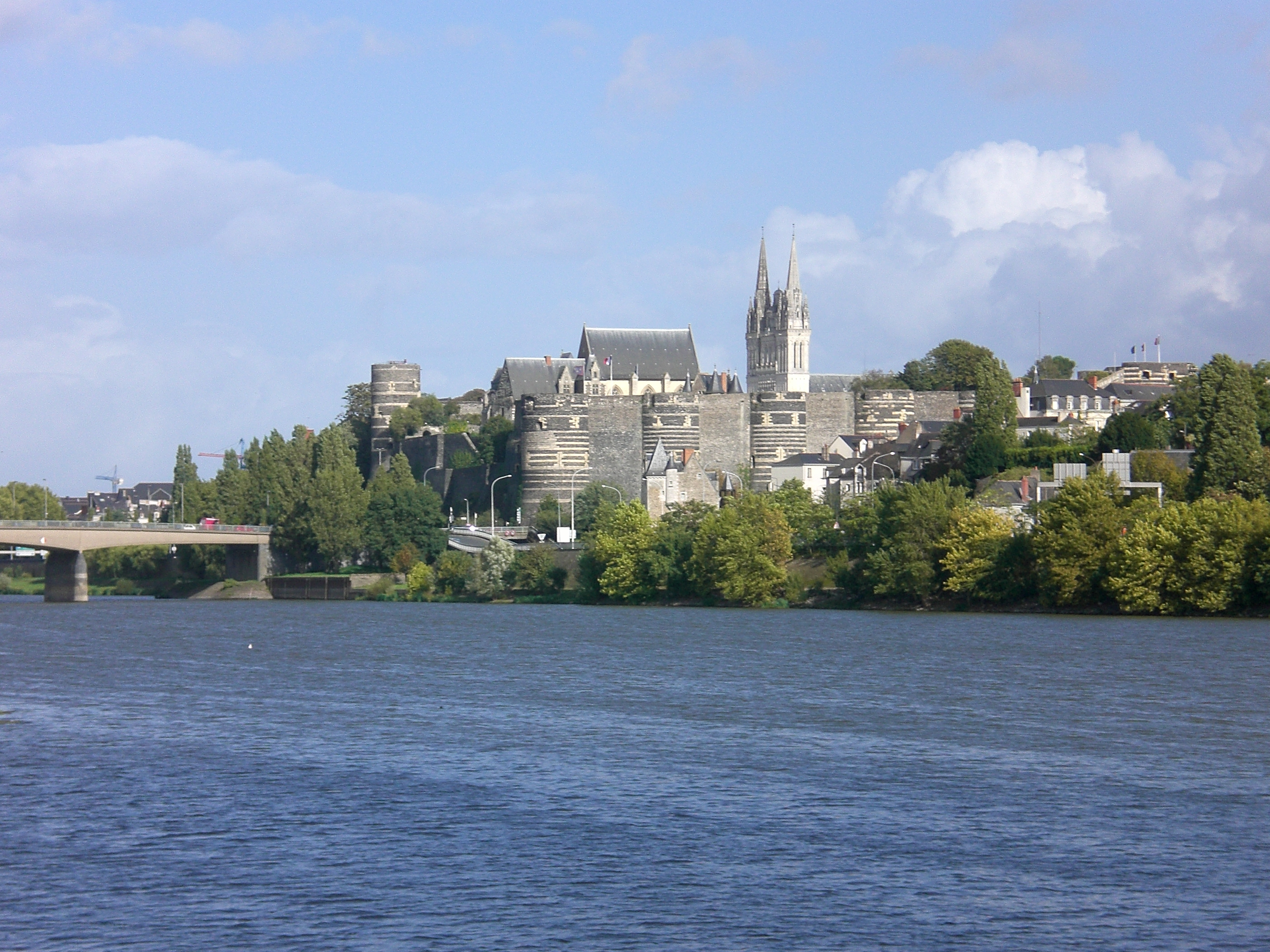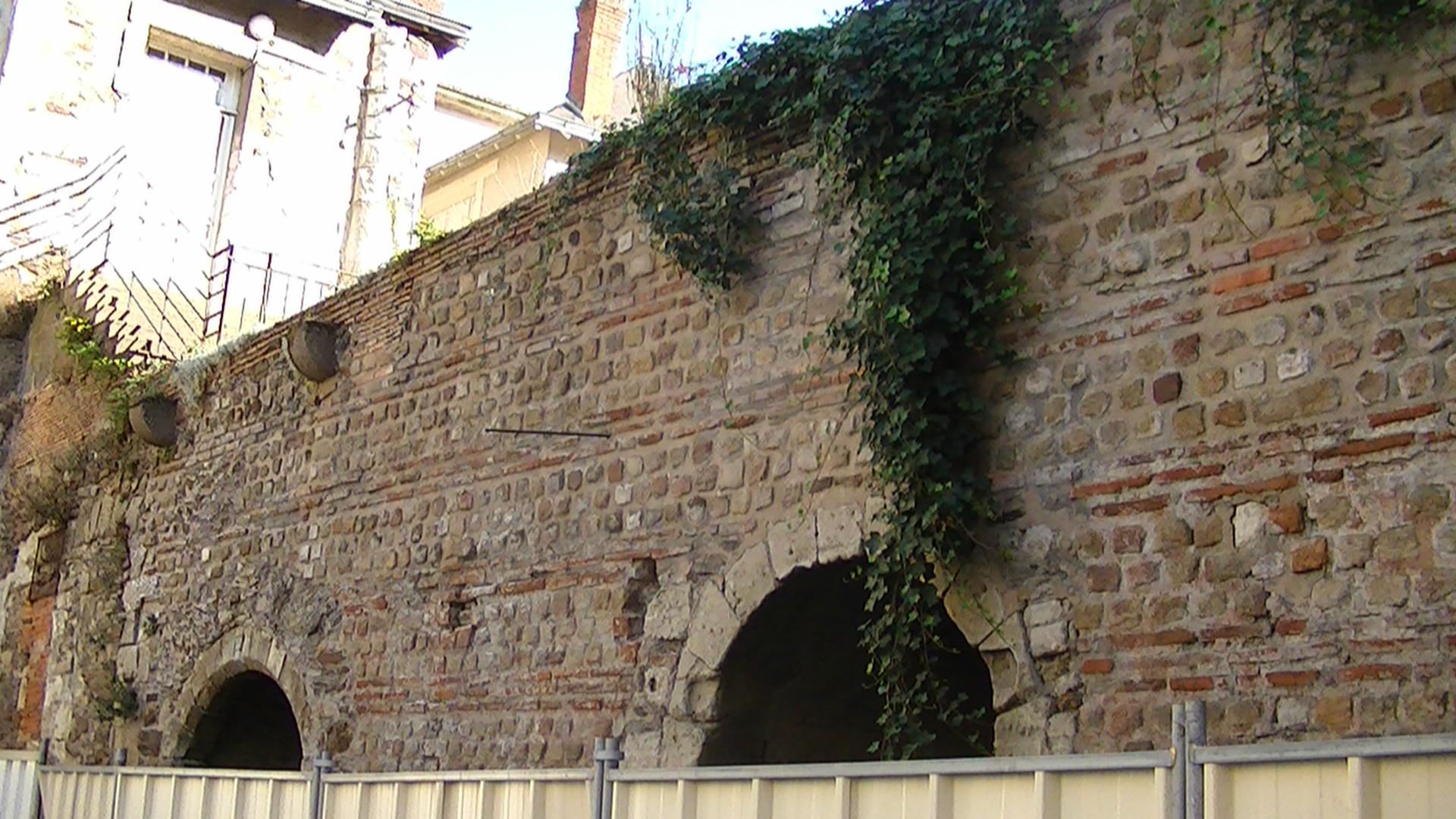|
Marie Of Luxembourg, Duchess Of Penthièvre
Marie of Luxembourg (February 12, 1562 - September 6, 1623), Duchess of Penthièvre from 1569 to 1623, Princess of Martigues, was the daughter of Sebastien de Luxembourg, Duke of Penthièvre and Marie de Beaucaire. She is an important figure in the history of the Duchy of Brittany; a distant descendant of Joan of Penthièvre, Duchess of Brittany and her husband Charles of Blois, Duke of Brittany, she aspired to restore the sovereignty of the duchy, and to ascend to the throne with her husband Philippe Emmanuel, Duke of Mercœur, brother-in-law of King Henry III and Governor of Brittany. The victory of Henry IV prevented her from carrying out her project. Life Marie of Luxembourg was born on February 12, 1562, in Lamballe. Her name stems from the fact that she was an 11th generation descendant of Henry V, Count of Luxembourg, therefore belonging to the French branch of the Luxembourg House. After she was born, her father went to Scotland to ask Mary, Queen of Scots to be ... [...More Info...] [...Related Items...] OR: [Wikipedia] [Google] [Baidu] |
Lamballe
Lamballe (; ; Gallo: ''Lanball'') is a town and a former commune in the Côtes-d'Armor department in Brittany in northwestern France. On 1 January 2019, it was merged into the new commune Lamballe-Armor. It lies on the river Gouessant east-southeast of Saint-Brieuc by rail. Lamballe station is served by high speed trains to Brest, Rennes and Paris, and regional trains to Brest, Saint-Brieuc, Dol-de-Bretagne and Rennes. History Lamballe was the capital of the territory of the Counts of Penthièvre, who in 1569 were made dukes. La Noue, the famous Huguenot leader, was mortally wounded in 1591 in the siege of the castle, which was dismantled in 1626 by Richelieu. The last Duke of Penthièvre granted his son Louis the title Prince of Lamballe. The Prince de Lamballe married Marie Therese de Savoie-Carignan and she took the title Princesse de Lamballe. The Princess lived with her father-in-law after the early death of her husband. She was a close friend of Queen Marie An ... [...More Info...] [...Related Items...] OR: [Wikipedia] [Google] [Baidu] |
Henry V, Count Of Luxembourg
Henry V the Blondell (1216 – 24 December 1281), called the Great, was the Count of Arlon from 1226 to his death, Lord of Ligny from 1240 to his death, Count of Luxembourg and Laroche from 1247 to his death, and the Marquis of Namur between 1256 and 1264 as Henry III. He was the son and successor of Waleran III, Duke of Limburg and Ermesinde, Countess of Luxembourg. Reign In 1226, following the death of his father Waleran III, Henry inherited the county of Arlon. In 1240 Henry married Margaret, daughter of Henry II of Bar and Philippa of Dreux. Henry's marriage to Margaret brought him Ligny-en-Barrois as her dowry, though, by a clause in the marriage contract, it remained under the feudal suzerainty of the County of Bar. In contempt of this, Henry paid homage in 1256 to King Theobald II of Navarre in the latter's capacity as Count of Champagne. Henry's brother-in-law Count Theobald II of Bar took advantage of the conflict then raging between Duke Frederick III of Lorra ... [...More Info...] [...Related Items...] OR: [Wikipedia] [Google] [Baidu] |
Rudolf II, Holy Roman Emperor
Rudolf II (18 July 1552 – 20 January 1612) was Holy Roman Emperor (1576–1612), King of Hungary and Kingdom of Croatia (Habsburg), Croatia (as Rudolf I, 1572–1608), King of Bohemia (1575–1608/1611) and Archduke of Austria (1576–1608). He was a member of the House of Habsburg. Rudolf's legacy has traditionally been viewed in three ways:Hotson, 1999. an ineffectual ruler whose mistakes led directly to the Thirty Years' War; a great and influential patron of Northern Mannerism, Northern Mannerist art; and an intellectual devotee of occult arts and learning which helped seed what would be called the Scientific Revolution. Determined to unify Christendom, he initiated the Long Turkish War (1593–1606) with the Ottoman Empire. Exhausted by war, his citizens in Kingdom of Hungary (1526-1867), Hungary revolted in the Bocskai uprising, Bocskai Uprising, which led to more authority being given to his brother Matthias, Holy Roman Emperor, Matthias. Under his reign, there was ... [...More Info...] [...Related Items...] OR: [Wikipedia] [Google] [Baidu] |
Holy Roman Emperor
The Holy Roman Emperor, originally and officially the Emperor of the Romans (other), Emperor of the Romans (; ) during the Middle Ages, and also known as the Roman-German Emperor since the early modern period (; ), was the ruler and head of state of the Holy Roman Empire. The title was held in conjunction with the title of King of Italy#Kingdom of Italy (781–962), King of Italy (''Rex Italiae'') from the 8th to the 16th century, and, almost without interruption, with the title of King of Germany (''Rex Teutonicorum'', ) throughout the 12th to 18th centuries. The Holy Roman Emperor title provided the highest prestige among Christianity in the Middle Ages, medieval Catholic monarchs, because the empire was considered by the Catholic Church to be Translatio imperii, the only successor of the Roman Empire during the Middle Ages and the early modern period. Thus, in theory and diplomacy, the emperors were considered first among equalsamong other Catholic monarchs across E ... [...More Info...] [...Related Items...] OR: [Wikipedia] [Google] [Baidu] |
César De Bourbon
Cesar or César may refer to: Arts and entertainment * ''César'' (film), a 1936 French romantic drama * ''César'' (play), a play by Marcel Pagnolt Places * Cesar, Portugal * Cesar Department, Colombia * Cesar River, in Colombia * Cesar River, Chile * César (restaurant), a restaurant in New York City People * César (name), including a list of people with the given name and surname * César (footballer, born 1956) (1956–2024), Brazilian football forward * César (footballer, born 1974), Brazilian football midfielder and defender * César (footballer, born May 1979), Brazilian football defender and coach * César (footballer, born July 1979), Brazilian football winger * César (footballer, born 1992), Brazilian football goalkeeper * César (footballer, born 1995), Brazilian football goalkeeper * César (sculptor), César Baldaccini (1921–1998), French sculptor Other uses * César (grape), an ancient red wine grape from northern Burgundy * César Awards, the ... [...More Info...] [...Related Items...] OR: [Wikipedia] [Google] [Baidu] |
Angers
Angers (, , ;) is a city in western France, about southwest of Paris. It is the Prefectures of France, prefecture of the Maine-et-Loire department and was the capital of the province of Duchy of Anjou, Anjou until the French Revolution. The inhabitants of both the city and the province are called ''Angevins'' or, more rarely, ''Angeriens''. Angers proper covers and has a population of 154,508 inhabitants, while around 432,900 live in its metropolitan area (''aire d'attraction''). The Communauté urbaine Angers Loire Métropole, Angers Loire Métropole is made up of 29 communes covering with 299,500 inhabitants (2018).Comparateur de territoire INSEE Not including the broader metropolitan area, Angers is the third most populous Communes of France, commune in northwes ... [...More Info...] [...Related Items...] OR: [Wikipedia] [Google] [Baidu] |
Gabrielle D'Estrées
Gabrielle d'Estrées, Duchess of Beaufort and Verneuil, Marchioness of Monceaux (; 157310 April 1599) was a mistress, confidante and adviser of Henry IV of France. She is noted for her role in ending the religious civil wars that plagued France for more than 30 years. She persuaded Henry to renounce Protestantism in favour of Catholicism in 1593. Later she urged French Catholics to accept the Edict of Nantes, which granted certain rights to the Protestants. As it was legally impossible for the King to marry her as he was already married to Margaret of Valois, he controversially petitioned Pope Clement VIII for an annulment in February 1599 to end his childless first marriage, and announced his intention to marry Gabrielle and have her crowned the next Queen of France, while legitimizing their three children born out of wedlock. Her coronation and wedding never occurred due to her untimely and sudden death. Birth Gabrielle d'Estrées was born at either the Château de la Bour ... [...More Info...] [...Related Items...] OR: [Wikipedia] [Google] [Baidu] |
King Of France
France was ruled by monarchs from the establishment of the kingdom of West Francia in 843 until the end of the Second French Empire in 1870, with several interruptions. Classical French historiography usually regards Clovis I, king of the Franks (), as the first king of France. However, historians today consider that such a kingdom did not begin until the establishment of West Francia, after the fragmentation of the Carolingian Empire in the 9th century. Titles The kings used the title "King of the Franks" () until the late twelfth century; the first to adopt the title of "King of France" (Latin: ''Rex Franciae''; French language, French: ''roi de France'') was Philip II of France, Philip II in 1190 (r. 1180–1223), after which the title "King of the Franks" gradually lost ground. However, ''Francorum Rex'' continued to be sometimes used, for example by Louis XII in 1499, by Francis I of France, Francis I in 1515, and by Henry II of France, Henry II in about 1550; it was ... [...More Info...] [...Related Items...] OR: [Wikipedia] [Google] [Baidu] |
Nantes
Nantes (, ; ; or ; ) is a city in the Loire-Atlantique department of France on the Loire, from the Atlantic Ocean, Atlantic coast. The city is the List of communes in France with over 20,000 inhabitants, sixth largest in France, with a population of 320,732 in Nantes proper and a metropolitan area of nearly 1 million inhabitants (2020). With Saint-Nazaire, a seaport on the Loire estuary, Nantes forms one of the main north-western French metropolitan agglomerations. It is the administrative seat of the Loire-Atlantique Departments of France, department and the Pays de la Loire Regions of France, region, one of 18 regions of France. Nantes belongs historically and culturally to Brittany, a former Duchy of Brittany, duchy and Province of Brittany, province, and Reunification of Brittany, its omission from the modern administrative region of Brittany is controversial. Nantes was identified during classical antiquity as a port on the Loire. It was the seat of a bishopric at the ... [...More Info...] [...Related Items...] OR: [Wikipedia] [Google] [Baidu] |
Roman Catholic Church
The Catholic Church (), also known as the Roman Catholic Church, is the List of Christian denominations by number of members, largest Christian church, with 1.27 to 1.41 billion baptized Catholics Catholic Church by country, worldwide as of 2025. It is among the world's oldest and largest international institutions and has played a prominent role in the history and development of Western civilization.Gerald O'Collins, O'Collins, p. v (preface). The church consists of 24 Catholic particular churches and liturgical rites#Churches, ''sui iuris'' (autonomous) churches, including the Latin Church and 23 Eastern Catholic Churches, which comprise almost 3,500 dioceses and Eparchy, eparchies List of Catholic dioceses (structured view), around the world, each overseen by one or more Bishops in the Catholic Church, bishops. The pope, who is the bishop of Rome, is the Papal supremacy, chief pastor of the church. The core beliefs of Catholicism are found in the Nicene Creed. The ... [...More Info...] [...Related Items...] OR: [Wikipedia] [Google] [Baidu] |
Catholic League (French)
The Catholic League of France (), sometimes referred to by contemporary (and modern) Catholic Church, Catholics as the Holy League (), was a major participant in the French Wars of Religion. The League, founded and led by Henry I, Duke of Guise, intended the eradication of Protestantism from Catholic France, as well as the replacement of the French Henry III of France, King Henry III, who had acquiesced to Protestant worship in the Edict of Beaulieu (1576). The League also fought against Henry IV of France, Henry of Navarre, the Protestant prince who became presumptive heir to the French throne in 1584. Pope Sixtus V, Philip II of Spain, and the Jesuits were all supporters of this Catholic party. Origins Local confraternities were initially established by French Catholics to counter the Edict of Beaulieu in 1576. Henry III of France, King Henry III placed himself at the head of these associations as a counter-balance to the ultra-Catholic League of Peronne. Following the repu ... [...More Info...] [...Related Items...] OR: [Wikipedia] [Google] [Baidu] |
Governor Of Brittany
This page is a list of royal governors of Brittany during the Ancien Régime. *Nominoe (841-851) *Enguerrand VII, Lord of Coucy (1380–1397) *Jean de Laval, Mayenne, Laval, husband of Françoise de Foix (1528-1554) *Jean IV de Brosse (1554-1565) *Sébastien de Luxembourg (1565-1569) *Louis III de Bourbon, Duke of Montpensier (1569–1582) *Philippe Emmanuel, Duke of Mercœur (1582–1598) *César de Bourbon, Duke of Vendôme (1608–1626) *Armand-Jean du Plessis, Cardinal Richelieu (1626–1642) *Anne of Austria, Queen Anne of France (1642-1666) *François Louis de Rousselet, Marquis de Châteaurenault (1704–1716) *Louis-Alexandre de Bourbon, comte de Toulouse, Louis-Alexandre de Bourbon, Comte de Toulouse (1716–1737) *Louis Jean Marie de Bourbon, duc de Penthièvre, Louis Jean Marie de Bourbon, Duke of Penthièvre (1737–1753) *Emmanuel-Armand de Richelieu, duc d'Aiguillon, Emmanuel-Armand de Richelieu, Duke of Aiguillon (1753 – c. 1770) History of Brittany Politics of Brit ... [...More Info...] [...Related Items...] OR: [Wikipedia] [Google] [Baidu] |






